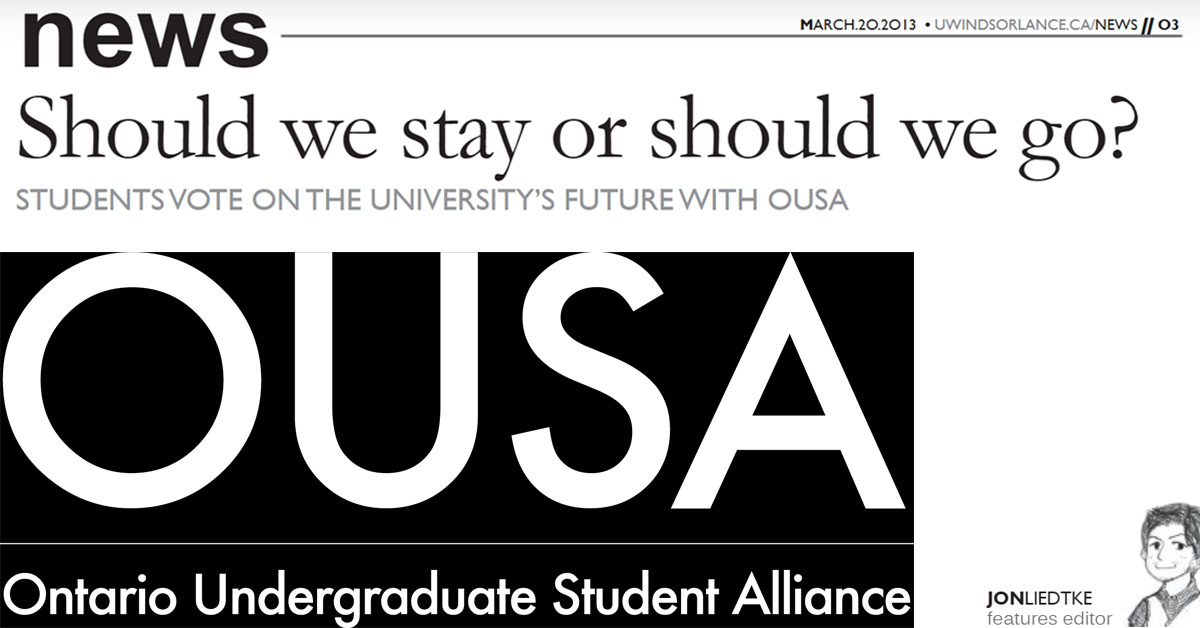UWindsor Lance
Issue 35, Volume 85
March 20, 2013
Jon Liedtke
STUDENTS VOTE ON THE UNIVERSITY’S FUTURE WITH OUSA
There’s an internal battle brewing within the university’s student union over the value of membership in the provincial alliance of student governments.
The executives of the University of Windsor Students’ Alliance are split on the worth of membership with the Ontario Undergraduate Student Association, which currently represents nine member associations and 155,000 undergraduate students across Ontario.
Both sides are heavily campaigning leading up to the upcoming UWSA general election, which will pose a referendum question to students to decide on OUSA’s fate.
“I think that OUSA has played an instrumental role in [improving student financial assistance, ability to control ancillary fees, investments in mental health and lobbying on behalf of students],” explained OUSA’s executive director Rylan Kinnon. “It’s difficult to say that one organization specifically is directly responsible for it. A lot of what OUSA does takes years [and is] building relationships, talking with student organizations, the government [and] stakeholders.”
However, Kinnon did say that OUSA could take credit for promoting student issues to the government and getting the government to adopt solutions that improve students’ experiences at university.
“The UWSA is having a referendum to determine whether students want to remain part of OUSA, and the reasoning behind that is it’s been so long since students entered into OUSA that we want to make sure that it’s still an organization which represents students and that students want to be a part of,” said UWSA president
Kimberly Orr.
Orr believes that members of the UWSA who oppose admission in OUSA do so because of ideological differences and OUSA’s stance on certain issues.
“OUSA has consistently lobbied for tuition fee increases and no one denies that, everybody agrees that OUSA has pushed for increases, there’s just been debate on how much,” expressed UWSA vice-president university affairs Mohammad Akbar.
“There are ideological issues with OUSA. When you support tuition fee increases, you’re supporting an ideology that students should be paying more and you’re not arguing for a progressive reduction in tuition fees,” said Akbar.
While in the past OUSA advocated and actively lobbied for tuition fee increases, today the organization is lobbying for a tuition freeze.
“Every year we take a new direction from students … we’re very proud that we’re able to respond to [changing] student needs. Since our inception, some of those lobbying priorities have changed significantly based on the political environment that we’re operating in, as well as what students want and need,” said OUSA president Alysha Li.
However, Akbar said the organization is not very member driven. “OUSA claims to be very member driven and easy in/easy out, but this year it hasn’t been very easy to leave. OUSA is consistently trying to prevent it and has asked to be on campus to answer questions but we can all see that that is campaigning … they’ve been on
campus to promote themselves to students because they see the ground that’s been lost,” said Akbar, adding that people have voiced concerns to him that OUSA is “lobbying for the government or supporting too many policies of the government.”
While Akbar believes that the roughly $35,000 sent to OUSA each year from undergraduate students could be better spent on campus, he acknowledged that if the university were to opt out of OUSA, that money would effectively disappear.
“It’s not like it’s going back to the UWSA,” he said, adding that a referendum question would need to be posed to students requesting an additional student levy.
While the UWSA’s official stance is to leave OUSA by a two-thirds majority, Orr and a handful of other UWSA members are campaigning to remain in the organization.
“I’m currently submitting an appeal to EMC (Electoral Monitoring Committee) in that regards because I believe that they’ve violated their bylaws when they asked me not to have an opinion on the matter,” said Orr. “Under my job description it
says that I’m only the representative of the UWSA in official capacities … class talks are not an official capacity of my job and at no point when we actually had the vote to take the ‘no’ side did we discuss silencing the voices of dissenters on council,” Orr added.
Akbar said, “What I find interesting is despite being president, Kim hasn’t taken on the role that the UWSA has told her to, which is to endorse the ‘no’ side … it’s ridiculous that the president of the organization that has voted ‘no’ is now heading the ‘yes’ side.”
When asked if it was inappropriate for the UWSA to endorse any side of the issue as it will eventually come down to a student referendum, Akbar responded, “No.”
“Especially in this context when OUSA is involved … it’s very important for the UWSA to step up and say these are real issues that we’re facing and that we need to talk to them about it, and promote the message wherever possible,” said Akbar.
Should we stay or should we go?
Issue 35, Volume 85
March 20, 2013
Jon Liedtke
Page 3
Jon Liedtke was the Features and Opinions Editor, Associate News Editor, Advertising Manager and Deficit Consultant at the UWindsor Lance.




Leave a Reply